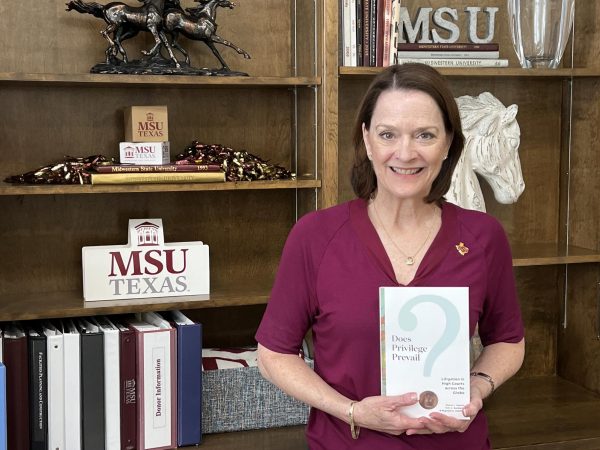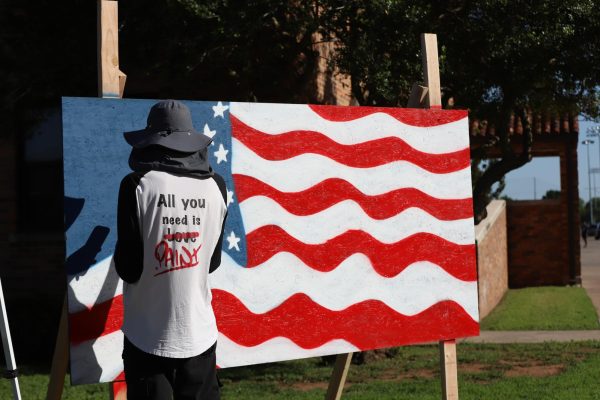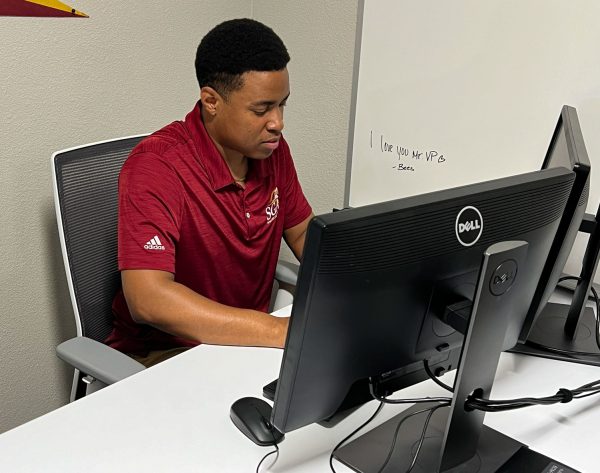Students ponder studying yonder
Do not be a student that dismisses the exhilarating idea of studying abroad because of the false assumption that the cost is too expensive. Studying abroad, as a college student, is a once in a lifetime experience.
Michael Mills, international education director, said, “No MSU student is paying the sticker price because of scholarships and some of the other things that are out there.”
Study abroad programs are available to students during each summer semester which allow them to travel while concurrently getting an education.
“Not only does it prepare you for the global marketplace and give you the skills that you need to be able to succeed in a world where we’re becoming more frequently intertwined on a global scale, it gives [you] a totally different perspective on kind of our place and our role in the bigger world and the world affairs,” Mills said.
Mills said he regrets not being able to study abroad during his college years. However, he is thankful his career has allowed him to travel abroad.
“Shortly after I got hired, one of my very first conferences was an international conference, and it was a very eye opening experience to me,” Mills said. “To have that opportunity right after college and into my career, it’s something that I’ve always advocated for other students.”
Cost effective
The study abroad office does not shy away from addressing the reality that college can be expensive for some students.
“Cost is going to be important to every student,” Mills said. “We try to do it so that we can package it to the student at the lowest possible price point.”
The maximum cost for a student to study abroad is $6,950, which includes a round-trip airfare, tuition, fees, housing and all program related transportation. According to Mills, this price is relatively close to the cost that students pay to study on campus.
“Look at [the] cost to take those classes abroad versus [the] cost to take them here on campus. That’s the real difference,” Mills said. “It’s not adding classes to your degree plan. It’s just are you taking them here on campus or are you taking them as part of a study abroad?”
Some students realize that the cost varies by person in that each person may have different scholarships available.
Margaret Greenhalgh, English senior, who studied abroad in London, said, “I can understand how they come up with those numbers. If you are dedicated and seek out all funding opportunities possible then you can usually find enough scholarships and such that the end result is pretty much the same. But [not] if you’re just looking at the price tag.”
Other students think the cost is not an issue in comparison to the price requirement they have seen with other universities.
Mass communication sophomore Clarissa Alvarado said, “It’s a decent price for a month. It’s not too expensive compared to other schools and their study abroad programs.”
The university itself does not make any financial gain when students decide to sign up for a study abroad program.
“There’s no profit incentive,” Mills said. “There’s no desire to make money. It’s simply to get our students to go.”
Financial aid
The Financial Aid Office works alongside the Study Abroad Office to assist students with finding alternative ways to pay for study abroad programs.
“My office works very well with the Business Office and with the Financial Aid Office,” Mills said. “You can come to the Study Abroad Office and fill out the purple form for financial aid.”
The short, one-page purple form is sent to the Financial Aid Office where staff will determine if a student has any available scholarships.
“That does not sign you up for the program. That does not obligate you to anything,” Mills said. “It will just let financial aid send you an estimate via e-mail of what type of scholarships, if there is grants or loans, available to you.”
This information is helpful to students that are curious as to how they would pay for a study abroad program.
“You can start to see what your financial aid package would look like should you want to study abroad,” Mills said. “Once you get that, then you can compare what it actually costs you to go study abroad versus what it would cost you to take them here on campus.”
All students are welcome to study abroad and most will find a class to contribute toward their major.
“Anyone is welcome to take some of the classes, but if you want financial aid to be of assistance, it does have to count toward your degree plan,” Mills said.
Locations to study
Students have the opportunity to travel to one of four places being Grenada, Spain, France or London.
“The Grenada program is in the May mini-term,” Mills said. “Spain and France is Summer I. Then, London is Summer II.”
Mills said some students choose to take back-to-back semesters while studying abroad.
“This past summer, we had three students who spent Summer I studying in Spain to get their Spanish language and then came over to London to get their mass comm credit.”
Workload
There is a heavy workload because there are fewer academic days in comparison to staying in the United States and studying on campus.
“You’re usually getting six hours credit in Spain, France and London. The classes are pretty intense,” Mills said.
When to go
According to Mills, the class year in which students decide to study abroad typically varies by the program “but the most popular would probably be the sophomore to junior year.”
“The London program are 3,000-4,000 level courses that usually happen between the sophomore and junior year or the junior and senior year,” Mills said. “Spain and France is typically sophomore to junior.”
However, the Grenada program is normally most applicable during the freshman to sophomore year.
“Grenada tends to be a little bit more freshman, sophomore because it’s a 1,000 level course class. But we also get them from sophomore, junior and junior, senior,” Mills said. “It really just depends on when you need the classes in your degree plan.”
More programs
The university staff is not planning to add any other study abroad programs or locations to their list of places, but they are open to the possibilities.
“We’ll definitely keep the four that we have because those are good quality programs,” Mills said. “There are locations that we might potentially be interested in, in the future. At this point, we’re sticking with the four that we have and making sure that we’re running the best program we can in the location that we’re already established before we start looking to add on to more logistics and locations”
Mills said that China or an Eastern European city like Prague could be some future possibilities.
“Almost all majors are represented now at some level in study abroad,” Mills said. “If we launch new programs in new locations, the reason is to add programs for other majors that we don’t currently serve.”
Safety aspect
The university staff makes the safety of all students a top priority while they are studying abroad. Greenhalgh said she felt safer walking to the grocery store at 2 a.m. than she does in Wichita Falls at 2 a.m.
“Obviously we won’t ever send students to a location where we don’t personally feel comfortable traveling ourselves or to a place that we feel like we’re putting students in danger,” Mills said. “We’re quite confident in all the locations where we’re sending students that they would be a safe location for them to study.”
Depending on the location, students either stay on university campuses or with a host family.
“London and Grenada, we’re staying on university campuses. So we’re in a regular dormitory style facility similar to what we would have here on campus,” Mills said. “France and Spain, because they are immersion and culture language classes, they stay with vetted host families who are cleared by the institute that we partner with.”
Mills said he encourages students to travel in groups if they want to go out and explore their new surroundings when outside of class.
“We don’t want students traveling alone,” Mills said. “That doesn’t mean you can’t walk to the grocery store right there, but if you’re going to be going out and traveling, we want students to be traveling with others just as a safety precaution, unless you’ve received permission.”
As an example, the staff has granted permission to students to travel alone in the past if they were going to visit their family.
“Sometimes we have students who have family in Europe or something, and they’re going to visit family. Obviously we want them to be able to do that. So unless there’s an extenuating circumstance, it’s usually we want you to travel in small groups,” Mills said.
While students take advantage of the given opportunity to travel when abroad, they must remember that they are there to learn.
“They’re good quality academic programs first, that also give students the opportunity to go and see and experience the other culture, but they’re there to be a student,” Mills said. “I think the fact that all of our students who come back are advocates wanting their fellow students to go tells you that they see the value in these programs.”
Greenhalgh said she would encourage other students to go and “would totally do it all over again in a heartbeat.”
Classes offered per brochure
- France – $6,400
- French Language
- French Culture
- Literature & Art
- Grenada
- Global Health and Wellness (HSHS 1013)
- London – $6,950
- Art –Graphic Design & Printmaking in Great Britain (ART 4743/4543)
- Business – International Issues in Business (BUAD 4993/4993 or 5993/6663)
- Computer Science – Evolution of Computing & Cybersecurity (CMPS 4883/4663)
- Criminal Justice – Comparative Criminal Justice (CRJU 4253/4923)
- Education – Global Education (EPSY 3153 & SOST 3003)
- English – Shakespeare in London (ENGL 4716 or 5773/5003)
- Fine Arts – Theatre (THEA 4393 & 4493)
- History – Modern Britain & the British Empire/Comparative World Religions & Culture (HIST 3153/3133 or 5153/5003)
- History – World War II (HIST 4933/4953 or 5003/5003)
- Mass Communication – Comparative Mass Media (MCOM 3503 & 3513)
- Public Health – Determinants of Health Disparities – A Comparative International Perspective (HSAD 4006 & 5006)
- Sociology – British Culture and Society (SOCL 4883 & 4893)
- Spain – $6,400
- Spanish Art
- Spanish Language and Culture
- Spanish Literature
- Spanish for the Professions
Come find out how you can study abroad this summer! #YouWontKnowUntilYouGo #MustangsAbroad @MidwesternState pic.twitter.com/nCboty6ZLH
— MWSU Study Abroad (@mwsu_abroad) February 26, 2018













